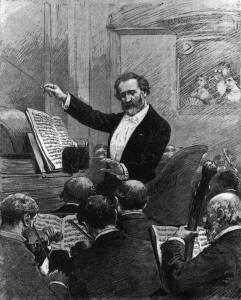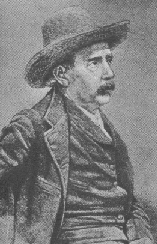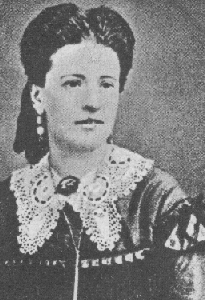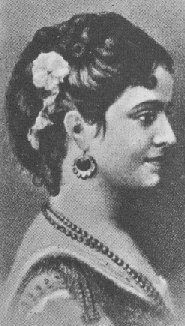 Giuseppe Verdi, conducting the "Aida" in Paris, 1880 |
Verdi came across this subject in his correspondence with Camille Du Locle (the writer of the libretto to his last-completed opera "Don Carlos") in 1869/1870 on the occasion of the upcoming festive opening of the Suez Canal in Cairo, in 1871 (the "Italian Opera" had been opened there with Verdi's "Rigoletto" in 1869). For a long time, his fee of 150,000 Francs was considered the highest fee paid to any opera composer in music history. Verdi who had, until this time, not been familiar with the subject of ancient Egypt, began a close collarboration with Du Locle that was based on the material of the French egyptologist Auguste Mariette Bey who apparently did not take it from fiction but from an existing ancient Egyptian legend the contents of which he might have deciphered in a papyrus scroll. Ultimately, however, the Italian Antonio Ghislanzoni was entrusted with the writing of the libretto.
 Antonio Ghislanzoni |
Although the year 1870 was characterized by Prussia's war against France, this tragic turn of events did not entirely stifle Verdi--who could not necessarily be considered a glowing admirer of Prussian militarism--in his creativity. Some musicologists even believe to recognize in the depiction of the Ethiopian king Amonraso who is brought to Thebes in chains by Radames, a last evoking by Verdi of the memory of France's unfortunate, captured emperor. Verdi did not only write the music to this opera but was also extensively involved in the shaping and dramatization of its plot. While the music itself was completed in mid-December of 1870, the instrumentation was ready in January, 1871.
However, the Egyptian premiere could not go ahead as early as desired since the costumes were detained in Paris and could not be released due to the political circumstances. In May 1871, Draneth Bey, the Egyptian representative, visited Verdi in Italy and urged him to hand over the score. Yet, Verdi hesitated once more and began to re-write some of the scenes so that new texts had to be written to them. While Verdi might have hoped for the Italian conductor Mariani to direct the Egyptian premiere, he was less disappointed in Mariani's championing the Bologna performance of Wagner's "Lohengrin" than by his refusal to take over the baton in Cairo.
 Caricature of Verdi, protesting against the "Lohengrinate" |
Nevertheless, it was still in 1871 that "Aida" would premiere in Cairo, namely on the 24th of December, an event to which Verdi, prone to sea-sickness, could not travel. Although this premiere was a brilliant success, Verdi might have considered his own, February 8, 1872 Milan premiere of "Aida" under his direction, with Teresina Stolz as Aida and Maria Waldmann as Amneris, as the for him more "measurable" success. Berlin audiences saw "Aida" for the first time in 1874.
 Teresina Stolz |
In spite of his understandable reservations against Prussian militarism, Verdi showed great fairness and realistic judgment when it came to music, itself. Thus he tried to see the Bologna performance of "Lohengrin" in order to form his own opinion. His presence, however, evoked an immediate Verdi ovation. Moreover, Verdi did not really believe in "musical schools" of any kind or in the actual existence of "Italian" or "German" music, but only in music.
Although the story of the Egyptian captain Radames who is chosen to lead the campaign against Ethiopia and who returns to Thebes victoriously, with the Ethiopian king Amonraso in chains, and who wants to take this victorious opportunity to ask his ruler to grant freedoom to his love Aida, slave of the Pharao's daughter Amneris, might be as well-known as the tragic outcome of events with his decision to flee to Ethiopia with Aida and her father Amonraso, his official bride Amneris' betrayal of him and his being delivered to the Egyptian High Priest Ramfis, his being sentenced and immured, and Aida's decision to share his fate with him, we are delighted to present you with a brief synopsis of it on the next page via the link below.
Adelina Patti (1843-1919),
one of the greatest
interpreters of the "Aida"
Why don't you then follow every dramatic step of this plot in connection with Verdi's incomparable music and let yourselves be entertained as well as enticed to form your very own opinions of this presentation? We wish you lots of enjoyment with all of this!
TO THE SYNOPSIS!
